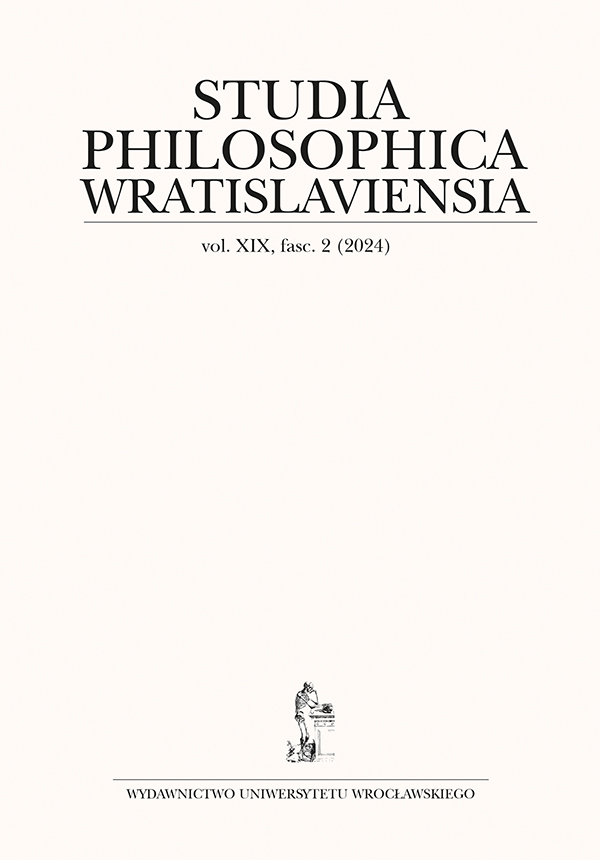

Artykuły

According to Frank Jacksonʼs knowledge argument, Mary, who lives in a black-and-white world, has all the physical knowledge about the world, yet she has new information when she sees a red apple. If we accept this, then physicalism – according to which the description of the world can be realised entirely with the help of physical theories – is false. However, even if Jacksonʼs argument about new information is true, we do not have to discard physicalism. Even exclusively physical computer systems are not capable of predicting their own sensory information if they are built using a specific structure and complexity. It can be shown that a specific type of computational system can lead to the creation of decision-related unpredictability of a specific type of sensory information. This investigation takes a charitable position towards the concept of qualia to provide it with a physicalist and computationalist explanation.
Ashby, W.R., 1957. An Introduction to Cybernetics. 2nd impression. London: Chapman & Hall, pp. 86–93.
Barkalov, A., Titarenko, L. and Mazurkiewicz, M., 2019. Foundations of Embedded Systems. Cham: Springer International Publishing, p. 195.
Chakravorty, P., 2018. What is a Signal? [Lecture Notes]. IEEE Signal Processing Magazine, 35(5), pp.175–177.
Copeland, B.J., 2020. The Church-Turing Thesis. In: E.N. Zalta, ed., The Stanford Encyclopedia of Philosophy (Summer 2020 Edition). [online] Available at: https://plato.stanford.edu/archives/sum2020/entries/church-turing/ [Accessed 22 May 2024].
Dennett, D.C., 1988. Quining Qualia. In: A.J. Marcel and E. Bisiach, eds., Consciousness in Contemporary Science. Oxford: Oxford University Press.
Deutsch, D., 1985. Quantum theory, the Church-Turing principle and the universal quantum computer. Proceedings of the Royal Society, 400 (1818), pp. 97–117.
Fossum, E.R. and Hondongwa, D.B., 2014. A Review of the Pinned Photodiode for CCD and CMOS Image Sensors. IEEE Journal of the Electron Devices Society, 2 (3), pp. 33–43.
Gonzalez, R., 2018. Digital Image Processing. New York, NY: Pearson. ISBN 978-0-13-335672-4.
Hartmanis, J. and Stearns, R.E., 1965. On the computational complexity of algorithms. Transactions of the American Mathematical Society, 117, pp. 285–306.
Henderson, L., 2022. The Problem of Induction. In: E.N. Zalta and U. Nodelman, eds., The Stanford Encyclopedia of Philosophy (Winter 2022 Edition). [online] Available at: https://plato.stanford.edu/archives/win2022/entries/induction-problem/ [Accessed 22 May 2024].
Hopcroft, J.E., Motwani, R. and Ullman, J.D., 2006. Introduction to Automata Theory, Languages, and Computation. Upper Saddle River, NJ: Prentice Hall, p. 31.
Jackson, F., 1982. Epiphenomenal qualia. Philosophical Quarterly, 32(April), pp. 127– 136.
Jackson, F., 2007. Epiphenomenal qualia. Translated by Á. Polgárdi. Difference, IX(1), pp. 67–82.
Jackson, F., 2008. What Mary didnʼt know. In: A. Gergely, T. Demeter, G. Forrai and J. Tőzsér, eds., Collection of Texts on Philosophy of Mind. Budapest: LʼHarmattan.
Jones, N.D., 1997. Computability and Complexity: From a Programming Perspective. Cambridge, MA: MIT Press, p. 227.
Knoll, T., et al., 2003. Adobe Photoshop Application Programming Interface Guide. Version CS ed. Adobe Systems, pp. 19–20. Retrieved November 28, 2019, via User-Manual.wiki.
Laplace, P., 2009. Essai Philosophique sur les Probabilités. 5th ed. Cambridge: Cambridge University Press.
Levine, J., 1983. Materialism and qualia: the explanatory gap. Pacific Philosophical Quarterly, 64, pp. 354–361.
Lloyd, S., 2012. A Turing Test for Free Will. Philosophical Transactions of the Royal Society A: Mathematical, Physical and Engineering Sciences, 370, pp. 3597–3610.
Mohri, M., Rostamizadeh, A. and Talwalkar, A., 2012. Foundations of Machine Learning. Cambridge, MA: MIT Press.
Nagel, T., 1974. What is it Like to be a Bat?. Philosophical Review, 83(October), pp. 435–450.
OpenAI, et al., 2023. GPT-4 Technical Report. arXiv. [online] Available at: https://arxiv.org/abs/2303.08774 [Accessed 22 May 2024].
Popper, K., 1950. Indeterminism in classical and quantum physics. British Journal for the Philosophy of Science, 1, pp. 117–133, 173–195.
Popper, K., 1992. The Open Universe: An Argument for Indeterminism From the Postscript to the Logic of Scientific Discovery. London: Routledge.
Popper, K., 1959, 2005. The Logic of Scientific Discovery. Taylor & Francis e-Library.
Sipser, M., 2006. Introduction to the Theory of Computation. 2nd ed. Boston, MA: PWS Publishing.
Sostai Zoltan, 2023. Analysis of the physical Church-Turing thesis and some philosophical implications of the halting problem. In: M. Nemes, ed., Impact Points IX. Proceedings of the Conference of the Philosophy Department of the National Association of Doctoral Students. Budapest: National Association of Doctoral Students, pp. 145–158.
Turing, A.M., 1936. On computable numbers, with an application to the Entscheidungsproblem. Proceedings of the London Mathematical Society, 42, pp. 230–265 [Erratum in Proceedings of the London Mathematical Society (1937) 43, p. 544–546].